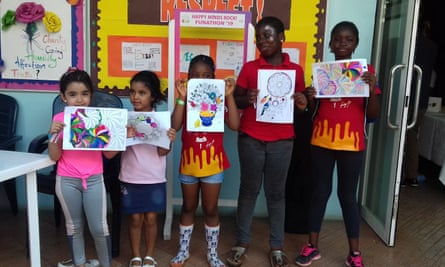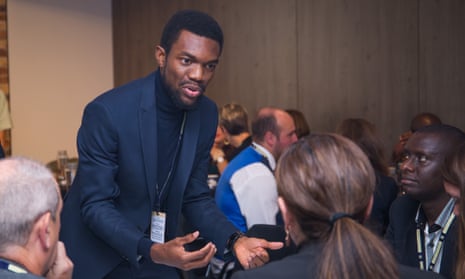It was a most unusual consultation. Dr Ayo Ajeigbe received the patient at his private practice in Abuja, Nigeria’s capital, in his customary welcoming manner.
But there was, it turned out, nothing wrong with the man. And when Ajeigbe asked why he was there, he simply replied: “I just wanted to see what a psychologist looked like.”
Perhaps he shouldn’t have been surprised. Mental health professionals are rare in Nigeria, as they are in many other developing nations. In Africa’s most populous nation – a country of more than 200 million people – there are an estimated 150 practising psychologists.
If mental health treatments are patchy, inadequate and underfunded in most western nations, they are practically nonexistent in the majority of lower- and middle-income countries – more than 100 countries worldwide. Here mental health provisions are the poorly resourced afterthought of health budgets that are in any case likely to be meagre.
So what is to be done? Ajeigbe decided that a partial answer lay in the voluntary sector. A year ago, he agreed to head up the Abuja section of Mentally Aware Nigeria Initiative (Mani), a burgeoning user-led organisation fast emerging as a multi-pronged solution to Nigeria’s mental health crisis.
Mani was launched in 2016 by Victor Ugo, a then medical student from Lagos who had suffered from depression, as a response to the lack of mental health support in Nigeria, where an estimated 7 million people have the same condition.
Ugo’s vision was to drive change by raising awareness and dispelling stigmas that exist around mental health issues in Nigeria. And on Wednesday, he will appear at the annual Goalkeepers event on the sidelines of the UN General Assembly in New York, to make the case for more funding and fairer treatment for mental health.
“If you have depression,” says Latifah Yusuf Ojomo, the deputy head of Mani’s Lagos team, “people can cast you as mad, which means that the majority of people who have mental health issues in Nigeria do not understand, or want to accept what they are feeling.”
From the outset, Ugo decided that if Mani was to have any significant impact it would need to focus attention on the country’s most populous demographic. “Young people [in Nigeria] are much more open to learning new things,” explains Ugo, “they are much more focused on ways to change.”
Mani needed a “cool factor”, something Ugo says was sorely lacking in the mental health sector: “Symposiums, that was all that was happening with mental health in Nigeria, just more and more symposiums, people would give a lecture saying we need to increase awareness, but nothing was happening.”
Ugo and a small band of medical students took to social media, sharing stories and launching online campaigns. Then in October 2017 they hosted their first event, not a symposium as Ugo is keen to point out, but a food fair: “We just said come and you can taste different delicacies, play games and talk about mental health in a cool way.”
The event was a huge success, and evolved into a series of monthly workshops focused on topics such as depression and anxiety. As Mani continued to grow in numbers, these meet-ups became known as “conversation cafes”, held in restaurants, parks and cafes, and eventually spreading to cities all over Nigeria, including Abuja and Ibadan.

Each month, a different topic is selected – childhood trauma, the benefits of mindfulness, relationship strains, the reactionary attitudes of the “village” – a case study is presented and discussion groups form.
Two years later, Mani is now a leading voice on mental health issues in the country, with more than 1,500 volunteers and active in 13 of Nigeria’s 36 states. Ugo is still taken aback by what the project has achieved. “We didn’t know we were going to end up here; in fact, I feel like we have been a hundred times more successful than we expected at the start.”
Despite the initial success, Ugo knew that still more needed to be done. “We thought if we don’t balance this with some kind of help, we will cause more harm than good.” So, in 2017, Mani launched a 24-hour mental health support service to run alongside its awareness campaigns. The service allowed people to reach out over WhatsApp or Twitter for emergency help in the form of advice, counselling and supportive listening. An emergency response team was also created via a network of volunteer counsellors. Mani also launched a confidential 24-hour suicide hotline. Attempted suicide is a criminal offence in Nigeria, punishable by up to one year in prison.
Quick GuideWhat is the Upside?
Show
Ever wondered why you feel so gloomy about the world - even at a time when humanity has never been this healthy and prosperous? Could it be because news is almost always grim, focusing on confrontation, disaster, antagonism and blame?
This series is an antidote, an attempt to show that there is plenty of hope, as our journalists scour the planet looking for pioneers, trailblazers, best practice, unsung heroes, ideas that work, ideas that might and innovations whose time might have come.
Readers can recommend other projects, people and progress that we should report on by contacting us at theupside@theguardian.com
Currently, only 3.3% of Nigeria’s total health budget goes towards mental health, which leaves the public system chronically understaffed. It also leaves Mani with a limited pool of professionals to recruit. As a solution to this, Mani launched a “train the trainer” system in which mental health professionals educate volunteers in subjects such as active assistance and safe talk (a programme that teaches participants to recognise and engage individuals who may be a suicide risk). Ajeigbe explains: “What we do is train people in fundamental mental health skills, so if I train 10 people, they can in turn reach 100 people.”
Mani’s volunteers come from a diverse range of backgrounds. Alle Ayodele, the head of the organisation’s Oyo state chapter, was studying microbiology when he decided to volunteer for Mani after coming across its support team on Twitter. He had been impressed by its speed and professionalism in responding to a series of suicide notes that were trending: “Mani took them really seriously, as soon as someone posted a note they stepped in.”
Ekene Okeke, from Lagos, has a background in sociology and criminology. After suffering from depression and connecting with Mani on Twitter, she decided to volunteer for it. Okeke was recently called out on an emergency where a woman had high levels of anxiety and had been alone for several days. “I dropped what I was doing, and spent hours talking with her, I even went and bought her ice-cream.” It’s moments like this, Okeke says, that make volunteering so rewarding: “In the end, the woman was able to calm down and has since reached out for help.”
Informal mental health support networks like this are becoming more prevalent around the world, as people realise that health systems cannot cope with mental illness, and that society will have to come up with other strategies. Examples include park bench psychotherapy in Zimbabwe, a peer-support initiative in Kenya, community-based self-help in Pakistan and the Phola organisation in South Africa.
In Lagos, Nigeria’s largest city, Mani has launched a training programme for schools. The programme will include a series of “mental health clubs” where students are taught about coping mechanisms, the effects of bullying and consent workshops. Mani also trains teachers and parents on children’s mental health, the latter a group that Ugo identifies as especially crucial. “Culturally, young people are not allowed to speak up,” explains Ugo, “you have to listen; respect is really crucial. If I need help, I ask my parents and they decide if I need help.”
When Mani’s WhatsApp service began in 2017 it immediately identified an issue. “Many more females seek help than men,” Ajeigbe explains, “this is because according to societal norms men are supposed to be emotionally strong.” About 85% of the initial calls were from women, so Ugo and his team researched how their service could appeal more to men. “We read that men are much better at using test-based services,” says Ugo, who immediately incorporated a test into the programme. This resulted in a 40% increase in men reaching out.
Recruitment of volunteers is one area where Mani does not need to worry – it currently has 500 applications waiting to be processed. “The good thing is that many people who talk to us end up volunteering for us,” says Ugo. More than 10,000 people have now spoken with Mani using its WhatsApp service.
The success of Mani may have exceeded Ugo’s initial expectations, but he is not one for complacency. He has now set his sights on persuading the government to change the national policy on mental health. He is also seeking a broader funding base, as 90% of the costs of the organisation are borne by the founders.
“At the moment we are still very much self-funded, Ugo says. “This is a big challenge, considering how much more impact we believe we can make, and the speed with which we are growing our network across Nigeria.”
Mani can be contacted at contact@mentallyaware.org and on +234 805 1493163
In the UK and Ireland, Samaritans can be contacted on 116 123 or email jo@samaritans.org or jo@samaritans.ie. In the US, the National Suicide Prevention Lifeline is 1-800-273-8255. In Australia, the crisis support service Lifeline is 13 11 14. Other international suicide helplines can be found at www.befrienders.org
